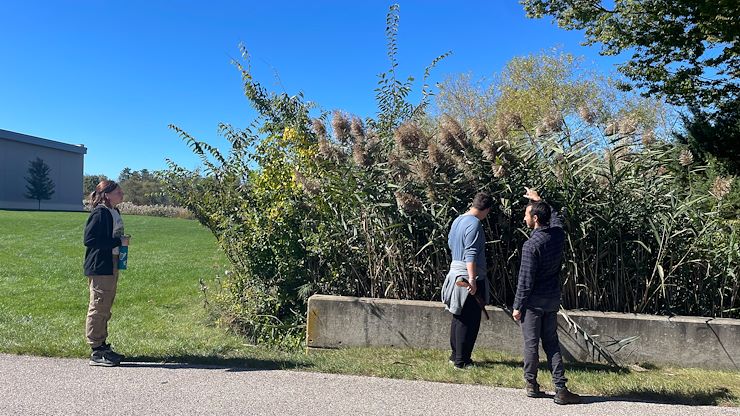
Sustainability Club President Aislinn Curran, Vice President Evan Figueroa and Secretary Matthew Izuka target invasive plant species needing to be removed from Blue Bell Campus during a recent cleanup project. More than 20 volunteers removed nearly 600 gallons of invasive plant life during the project. Photo by Michael Wyant.
Students in the Montgomery County Community College Sustainability Club removed nearly 600 gallons of plants from Blue Bell Campus during an invasive plant species cleanup project recently. The Club plans to hold similar events in the spring and fall each year going forward in an effort to eradicate harmful plants and improve the campus’ ecosystem.
The three-hour event Oct. 13 included more than 20 volunteers removing invasive plant species from four locations on the campus grounds. The plants included Autumn Olive, Invasive Phragmites, Multiflora Rose, Oriental Bittersweet and Japanese Honeysuckle, which were targeted for choking out the native species.
Sustainability Club President Aislinn Curran said Blue Bell Campus is populated by a large number of deer, which tend to feed mostly on native plants, giving the invasive plants an unfair advantage.
“This project then creates spaces for native plants and competition,” said Curran, a High School Dual Enrollment student who is homeschooled from Jenkintown, who’s been studying at MCCC for three years.
Club officers including Curran, Vice Presidents Evan Figueroa and Brittany Morgera, and Secretary Matthew Izuka prepared for the event by surveying the campus and identifying four locations where invasive planet species were most prevalent. They chose which plant species to remove and prepared a field guide and pre-event lecture to educate on the history of these species and purpose of the event.
“First we opened to the general public, anyone on campus was allowed to join, and we taught a workshop,” said Figueroa, a Secondary Education major from Abington. ‘We were able to go out and target four invasive plants we saw the most in the environment. We walked to different areas and were able to stop and show people what we would be taking out.”
On the day of the event, the volunteers were divided into four teams of five and spent the day filling bags with plants. The group gave special thanks to the Facilities Department crew members who were able to provide them with necessary equipment to safely remove the plants including gloves and tools.
The club’s members said the event was a lot of fun and got them excited to continue the work in the future.
“Overall, the event was a huge success,” said Sustainability Club Advisor and Geology Assistant Professor Michael Wyant, “and provided students with the opportunity to be a force of environmental change right here in their own college community.”
“It was great just meeting new people who were there to help us out with this,” said Sustainability Club member Rowan Wollard, an Environmental Studies major from Willow Grove. “It was amazing. Even though it was very labor-intensive work, it was still really fun to be with people.”
Figueroa enjoyed learning more about the issue and then using his teaching skills to educate volunteers about what they would be doing and how they could help.
“For me it was learning on both ends. Teach and learn. And have fun while you’re doing it,” he said.
“As someone who wants to work with plants for a career, I enjoyed being in nature and getting to work in the plants and seeing the difference,” said Izuka, a Liberal Studies major from King of Prussia. He’s planning to transfer to Delaware Valley University to study horticulture. “I took pictures before and after and you can really see how the woods opens up.”
“My favorite part was seeing the progress, not just the before-and-after photos, but the bags of plant material,” said Morgera, a Life Sciences major from Pottstown. She’s transferring to Ursinus College to study Biology. “We had to remove it completely. Seeing how many bags we went through quantified the impact we had. It made me excited to continue. The more we do it, the more we’re able to see a difference. It’s incremental, long-term progress over time. It was very satisfying.”
“I enjoyed spending time with the community,” said Curran, who’s also studying Life Sciences. “We were together for three hours that day and it felt like a really great coming together of everyone. It was a really actualizing goal. It was really rewarding seeing the lead up and planning come to fruition. I loved spending time with club members. It was all really awesome.”
Those interested in learning more about the Sustainability Club and its activities are encouraged to stop by the Sustainability Lab in the Science Center Room 293.
